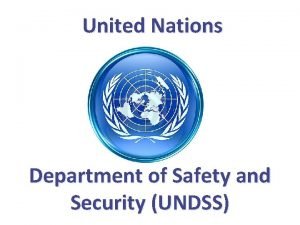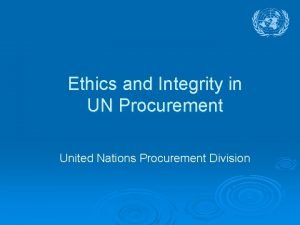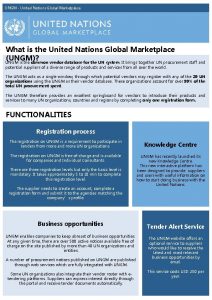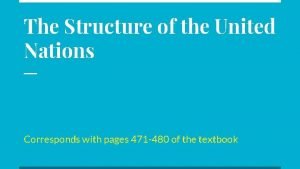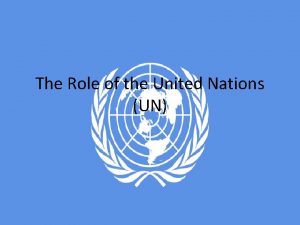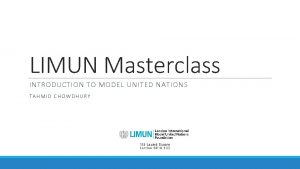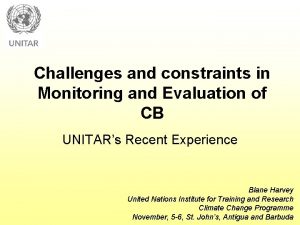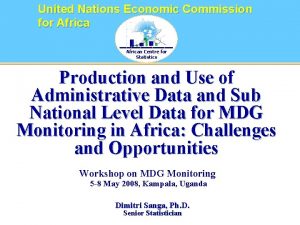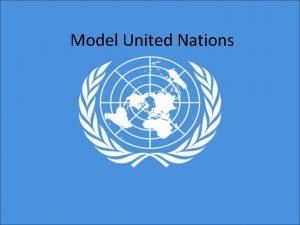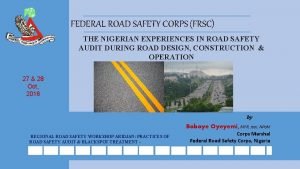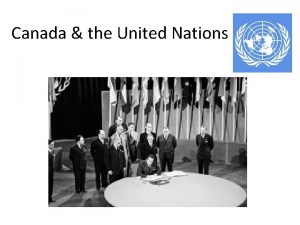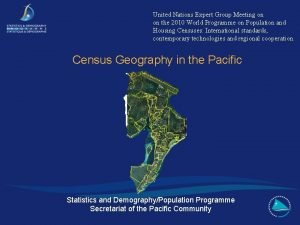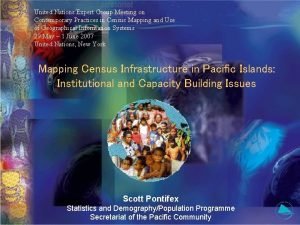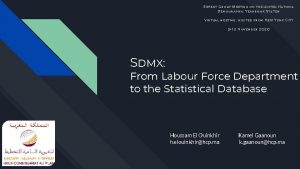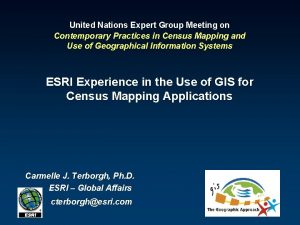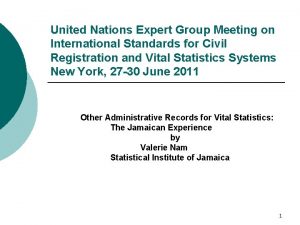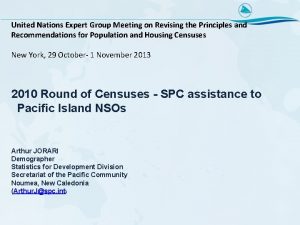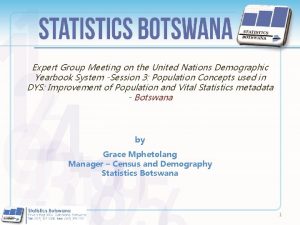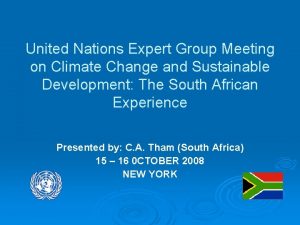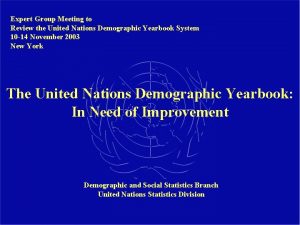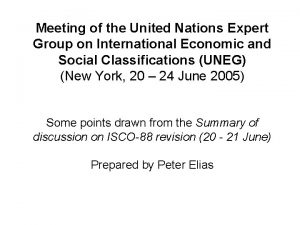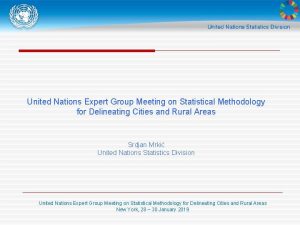United Nations Interagency and Expert Group Meeting on















- Slides: 15

United Nations Interagency and Expert Group Meeting on the Development of Gender Statistics New York, 12 -14 December 2006 Availability and Use of Tools and Materials for the Compilation of Statistics and Indicators Demographic and Social Statistics Branch United Nations Statistics Division 1

Increasing the use of available data • There a lot more data than we are using, even for gender statistics • Use of data uncovers gaps, deficiencies as well as unique/special features of datasets • There is a greater chance of influencing the production of statistics when informed feedback and criticisms are given • Compilation of available data is a first step to improving availability of gender statistics 2

Women and Men publications at national level Five of eight countries have such a publication • • • Albania (annually, 1997 -2005) Jordan (1999, one time) Philippines (1995, 1999, 2003, 2006) Serbia (2005) Uzbekistan (2006) 3

Focus on Gender Statistics Compilation Basic Questions • What tools and materials are available from UN Statistics Division • How have they been used to further the development of gender statistics? • What other tools and materials are being used? • How can we increase the use of the materials? • What remains to be done? 4

UNSD Tools and Materials • Handbook for Producing National Statistical Reports on Women and Men (1997) • Wistat Women’s Indicators and Statistics Spreadsheet Database for Microcomputers (Version 2): Users Guide and Reference Manual (1992) • Handbook for National Statistics Data Bases on Women and Development (1990) 5

UNSD Tools and Materials Technical reports • Guide to Producing Statistics on Time Use: Measuring Paid and Unpaid Work (2005) • Methods of Measuring Women’s economic activity (1993) • Methods of Measuring Women’s Participation and Production in the Informal sector (1990) 6

Main purposes of available tools and materials • Training • Potentially all but a selection produced for this primary purpose • References • All publications, reports, technical manuals, handbooks • Examples or models • National, regional and global reports, serve to guide countries/institutions to produce similar outputs) 7

Use of Materials for Training • Handbook for Producing National Statistical Reports on Women and Men (1997) • Engendering Statistics: A Tool for Change (1996) • Guide to Gender-Sensitive Indicators (1997) 8

Materials used for Reference Programme development (regional) • • Regional Workshop on Women and Men in the ESCAP Region (two workshops) Southern and Eastern African Countries (two workshops) Regional Workshops • • Regional Workshop on Social and Gender Statistics in the CARICOM Region (2000) Gender Statistics Workshop in the Arab Region (1997, conducted by ESCWA) National Workshops • Ghana 9

Other Tools and Materials Gender statistics reports (national and regional) • Women and Men in … • Women in… Gender statistics booklets • Women and Men in… Gender statistics global reports • The World’s Women … 10

Materials used by some countries for Reference • • • Indicators for Monitoring the Millennium Development Goals (UN) The World’s Women: Trends and Statistics (UN) Handbook for National statistical Database on Women and Men (UN) Handbook for Producing National Statistical Reports on Women and Men, 1997. UN, New York Gender sensitive indicators: A key tool for gender mainstreaming (FAO) Gender Mainstreaming In Practice: A Handbook (UNDP) Women in figures (UNFPA - Arab countries) Human Right Development. Engendering Statistics: A tool for change, 1996. (SIDA/Statistics Sweden) Guide to gender sensitive indicators (CIDA) 11

Websites Used by some countries for Reference • http: //www. unece. org/stats/gender/ • http: //www. statistics. gov. uk/Stat. Base/Produ ct. asp? vlnk=1607&Pos=&Col. Rank=1&Ran k=272. (ONS-- United Kingdom) 12

No materials cited • Country X (Six training workshops, six consecutive years of “Women and Men in …) • Country Y (no training workshops, no specialized gender statistics publication) 13

Observations on the use of available tools and materials Only one or two references cited by each country • Why so few countries make use of the resource available? Several of the countries have attended regional workshops/seminars • Why are they not informed about the available materials? • Are any of the institutions using others materials? There is almost no training conducted at the national level on the compilation of gender statistics • How should capacity of gender units and gender focal points be developed? 14

Future work • What are the gaps? • • • Topics missing? Updating of information? Aspects of data compilation, presentation and analysis yet to be covered? • To what extent are new initiatives addressing the gaps? • How can these and other materials be usefully combined? • How can agencies collaborate to build capacity in a sustainable way? 15
 Undss security
Undss security Ethics and integrity at the united nations
Ethics and integrity at the united nations United nations
United nations Ungm
Ungm Six main organs of the united nations
Six main organs of the united nations What is the role of the united nations?
What is the role of the united nations? Introduction to model united nations
Introduction to model united nations Constraints in monitoring and evaluation
Constraints in monitoring and evaluation United nations zambia
United nations zambia United nations
United nations United nations
United nations Model united nations
Model united nations The agency sponsored by the united nations that compiles
The agency sponsored by the united nations that compiles Functions of federal road safety corps
Functions of federal road safety corps Christian saunders united nations
Christian saunders united nations Cold war
Cold war
